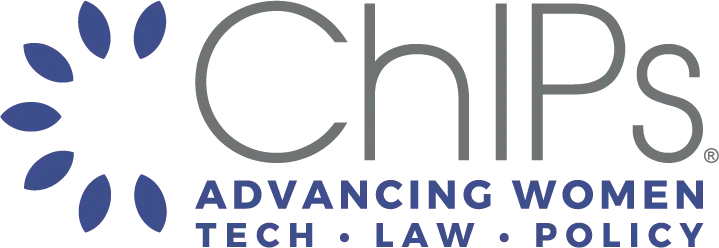“There is a strong correlation between women in IP law and female inventorship. Inclusion of women and other underrepresented groups is critical to advancing a robust innovation ecosystem.”— Joan Toth
ChIPs Network, the global community representing more than 7,000 women in technology and intellectual property law and policy, has released a new research report highlighting the experiences of its members and proposing solutions to advancing and retaining women in the legal profession.
The report — Inclusion and Innovation: Retaining and Advancing Women in Tech, Law and Policy, features results of a survey conducted last fall with the University of California Berkeley School of Law. Of the 374 ChIPs members completing the anonymous survey, 206 worked in-house at corporations and other organizations, and 168 respondents worked at law firms.
“While ChIPs members taking our survey have witnessed positive changes toward women in the past five years, only 6% of in-house respondents and 14% of law firm respondents rate their workplace ‘very good’ when it comes to creating career opportunities,” said Joan Toth, ChIPs executive director. “Lack of management support, lack of flexible work options and bias in favor of men are top reasons respondents would consider quitting,” she said.
According to Zippia, just 21% of patent lawyers and 33% of intellectual property lawyers are women (and they earn only 93% of what their male counterparts do.) Gender parity is only slightly improved in-house, where just 38% of general counsels, 38% of associate GCs, and 40% of assistant GCs are women. Meanwhile, women are listed in just 23% of all patent applications globally and just 21.9% in the United States, according to the World Intellectual Property Organization (WIPO).
Inclusion Drives Innovation
“There is a strong correlation between women in IP law and female inventorship,” Toth said. “Inclusion of women and other underrepresented groups is critical to advancing a robust innovation ecosystem” she said.
Toth applauded Director Kathi Vidal of the United States Patent and Trademark Office for making inclusion in innovation a top priority. USPTO initiatives include paid internships for undergraduate students, a fast-track program for inventors who are filing their first patent applications, and WE, a new program for women entrepreneurs.
The USPTO created a new Design Patent Practitioner designation in January, opening the design patent process to people with degrees in industrial design, product design, architecture, applied arts, graphic design, fine/studio arts, and art teacher education — “a big step forward,” according to Toth.
“ChIPs signed a memorandum of understanding with the USPTO last November to collaborate on initiatives to promote underserved groups in innovation, especially gender equity, and we look forward to working with the USPTO and others to increase inclusion in innovation,” Toth said.
“These initiatives are vital, but as our survey suggests, retaining and advancing women in the legal profession is an inside job,” Toth said. “New policies and work cultures are needed to advance the next generation of women professionals and retain experienced women in tech, law and policy.”
Toth said, “Upward career trajectories, equitable compensation, management support, work from home, flexible work options and mentoring are needed to create workplaces where female talent is respected, rewarded — and retained.”
